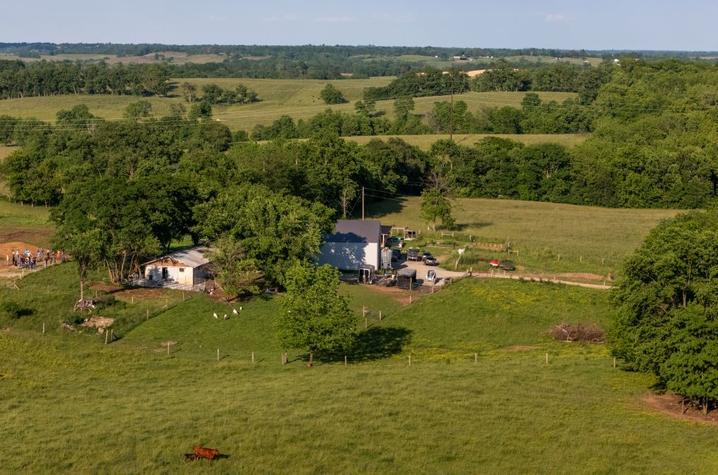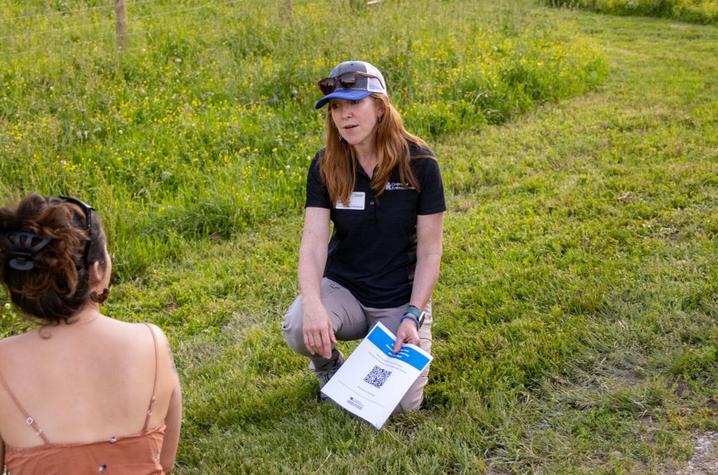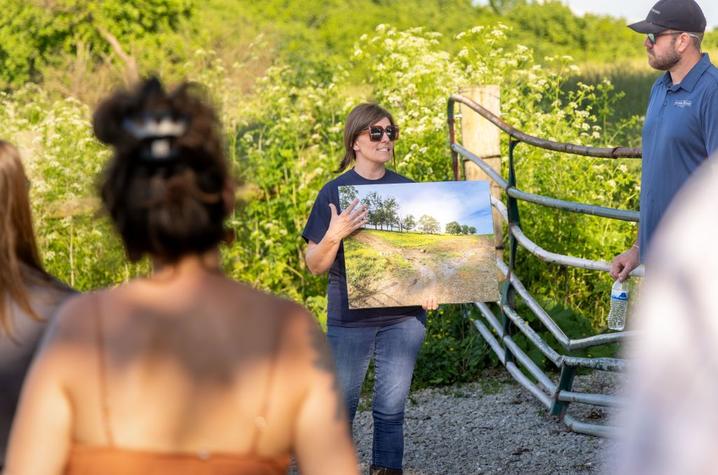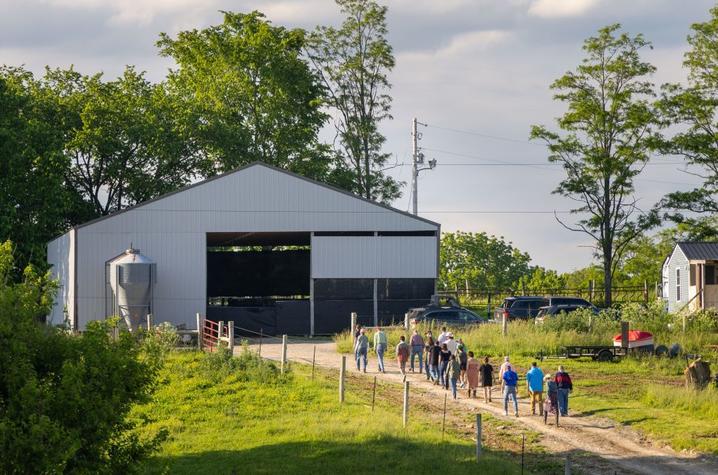‘Putting all the pieces of Extension together’: Water conservation practices in full display at local farm
PARIS, Ky. (June 26, 2025) — “It’s important to protect the waters that provide us drinking water,” said Amanda Gumbert, extension water quality specialist in the Department of Forestry and Natural Resources at the University of Kentucky Martin-Gatton College of Agriculture, Food and Environment (CAFE), project lead and principal investigator (PI) of two grants from the U.S. Environmental Protection Agency that supported her research. “All of us drink water every day, and we need that to be healthy.”
Farmers and the community were invited to learn more about applied water conservation practices at the recent Robin Ridge Farms Field Day event in Bourbon County. With additional support from the UK Cooperative Extension Service, participants got a closer look at how Robin Ridge Farms is using these practices to manage their winter feeding, water access and address soil erosion challenges.
Robin Ridge Farms is located in the Hinkston Creek watershed, which flows into the Licking River and provides municipal drinking water for several communities in Bourbon and surrounding counties. Protecting runoff — water that flows over the land and not into the ground — and reducing the amount of municipal treatment by minimizing the amount of manure or sediments getting into the waterway is paramount.
Ben and Savannah Robin, owners of Robin Ridge Farms, led the walking tours which included several stops to highlight their conservation practices including gateway protection, drainageway shaping and seeding, fencing, feed pad/bale grazing and stream fencing.
“Field days are one of my favorite parts of extension, providing an opportunity for peer-to-peer learning when we partner with local farmers,” said Lee Moser, senior agricultural extension associate at Martin-Gatton CAFE and co-PI. “It was great to see the conversations between the attendees and the Robins about the practical considerations of implementing conservation practices on their farm. Local farmers were also able to connect with representatives from their local resource agencies about issues and possible projects on their farms.”
After the Robins purchased the farm in 2016 and experienced first-hand the large amount of rain and flooding impacting Kentucky in recent years, they began thinking about investing more into their water conservation and management. They decided to participate in a farmer watershed leadership workshop called Tap Your Potential, held at the Harrison County Extension Office, targeted to farmers in the Hinkston Creek watershed.
From here, Gumbert began working with the Robins on special projects to implement some of their conservation needs on the farm.
“The first time visiting Robin Ridge Farms, they had just experienced heavy rainfall and were seeing some erosion — creating gullies down their driveway and in their fields,” Gumbert said. “Now that they are putting these conservation practices on the ground, it will really help their farm be resistant to erosion, especially during heavy rainfall.”
The Robins then joined the One Good Idea Shop Talks, supported by the UK Cooperative Extension Service, which allows farmers and producers to engage in a peer-to-peer dialogue centered around row crop and livestock conservation efforts. The Robins, along with other farmers, were able to share their experiences in implementing various farm practices.
“It’s really powerful when we can get farmers together, whether it be virtual space or a farm field day, to talk to one another,” Gumbert said. “They can share ideas on a practice that has worked for them or one they tried, but didn’t like. There’s just a lot of power in that peer-to-peer learning.”
Along with the One Good Idea Shop Talks, Gumbert said extension plays an important role in helping Kentucky farmers, like the Robins.
“We offer a lot of assistance to our farmers,” she said. “Our county extension agents and specialists throughout the state offer that one-on-one assistance directly to farmers that can help answer questions and offer assistance for tackling these problems that our farmers are seeing.”
Furthermore, Gumbert believes that events, like the Robin Ridge Farms Field Day, showcase all aspects of extension.
“We use the research from our team; we share it with the community and our farmers. They apply it on their farm and then show it to other farmers and hopefully influence others to do similar practices,” Gumbert said. “Events like today really showcase putting all the pieces of extension together.”
Learn more about the Soil and Water extension efforts in the Department of Forestry and Natural Resources at Martin-Gatton CAFE at https://soilandwater.ca.uky.edu. Learn more about UK Cooperative Extension at https://extension.ca.uky.edu.
This project is funded wholly or in part by the United States Environmental Protection Agency under assistance agreement number 00D87719 to Beth Baker at MSU. The contents of this document do not necessarily reflect the views and policies of the Environmental Protection Agency, nor does the EPA endorse trade names or recommend the use of commercial products mentioned in this document.
This work was funded in part by a grant from the U.S. Environmental Protection Agency under §319(h) of the Clean Water Act through the Kentucky Division of Water to the University of Kentucky (Grant #23-02).
As the state’s flagship, land-grant institution, the University of Kentucky exists to advance the Commonwealth. We do that by preparing the next generation of leaders — placing students at the heart of everything we do — and transforming the lives of Kentuckians through education, research and creative work, service and health care. We pride ourselves on being a catalyst for breakthroughs and a force for healing, a place where ingenuity unfolds. It's all made possible by our people — visionaries, disruptors and pioneers — who make up 200 academic programs, a $476.5 million research and development enterprise and a world-class medical center, all on one campus.








